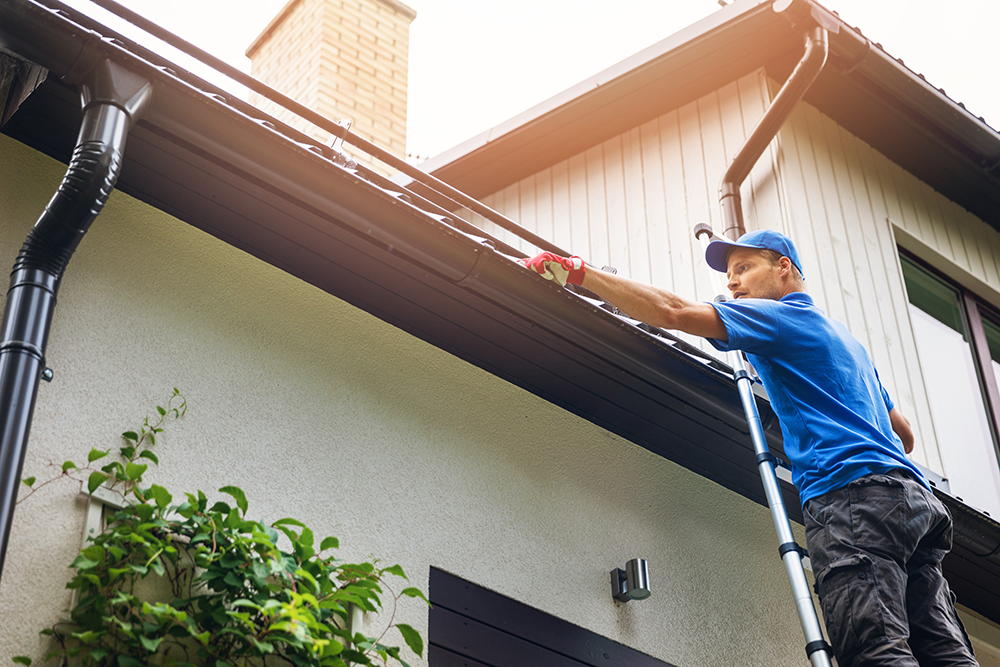How to Prep Your Home for a Hurricane

When it comes to hurricane season, it is always better to be safe than sorry. Late August into early September have historically been when tropical storms and hurricanes are the most active. Having a leaky roof, flooded basement, or mold growing under the floorboards are all serious issues that no homeowner wants to face.
Before a storm arrives, make sure to take extra precautions so your home can hold up against some of the complications that this type of natural disaster may cause. Keep in mind if you’ve been ordered to evacuate, you should do so as soon as possible.
Have an Evacuation Plan
The most important precautionary measure you can take during hurricane season is to have an evacuation plan. Create this evacuation plan ahead of time with family members, pets, and anyone else who lives with you in your home. It may be helpful to conduct a trial run so everyone knows exactly what to do during an actual natural disaster.
Review Your Insurance
If a storm is headed your way, you should review your homeowners insurance and ensure that your policy includes the necessary coverage. Homeowners insurance does not cover flooding, so it is a good idea to explore coverage options.
You should make sure valuable items are covered for loss or damage. The best way to determine if your homeowners insurance has enough coverage for your personal belongings is to take a home inventory and keep it with you. Hurricane or not, it’s a good best practice for homeowners to annually update their home inventory as well as review their homeowners insurance.
If you don’t have homeowners insurance, it may be a good idea to explore your options.
Clean the Gutters and Drains
Gutters play a vital part in guiding water flow away from your home. If your gutters are clogged, it could create water buildup which may cause flooding, erosion, or mold.
Check Your Sump Pump
Your sump pump’s main job is to keep your basement or crawl space from flooding. So, before a storm hits, it is very important to make sure it is operating correctly. Ensure that the pump is clean to prevent it from clogging and that you have a battery backup in the event of a power outage.
Check the Roof
Examine your roof for potential exposures or damage – keep an eye out for any cracks, missing tiles, loose shingles, or sagging edges. If you do catch something, call an expert right away to have them fix it as soon as possible.
Prepare Windows, Doors, and Garage Doors
Gaps in windows and doors allow water to seep inside, so it is a good idea to make sure your doors and windows are sealed properly. Inspect the caulking around your windows and reapply wherever necessary. Reseal any stripping or gaps for doors.
Replace old garage doors and tracks with a door that can hold up against strong wind pressure. You may also purchase garage door braces to further secure it from blowing away.
Clear the Outside Perimeter
Walk the perimeter of your property and secure any objects such as grills, outdoor furniture, or swing sets that could potentially become airborne and damage your home. Encourage your neighbors to do the same.
Stock Up on Emergency Supplies
When a natural disaster warning is issued, local stores can get packed and begin to lose their inventory of non-perishable items fairly quick. Avoid the mad rush and prepare ahead of time by having the following in your pantry:
- Flashlight
- Batteries
- Matches
- Candles
- Drinking water
- Canned food
- First-aid supplies
Having a natural disaster kit ready to go is always a good idea. Some other items you might consider purchasing are sandbags to soak up water in case of flooding, a generator in case of a power outage, and plywood to cover your windows.
Remember, if you have been ordered to evacuate, please do so. Click here for a full guide on how to prepare for a significant hurricane. It is wise to take as many precautions as you can well ahead of hurricane season. Even if you do not live in a storm-prone area, following these safety measures is still a good idea.
This is not financial or credit management advice. The included content is intended for informational purposes only and should not be relied upon as professional advice. Consult with a finance professional for tax advice or a mortgage professional to address your mortgage questions or concerns. This is an advertisement. Prepared 8/14/2019.
